
If you’ve been injured in a jackknife truck accident involving a commercial vehicle, you may be facing physical pain, emotional stress, and uncertainty about what comes next. These serious crashes are especially common on major Indiana highways, such as I-65, I-70, and I-465, where large trucks travel at high speeds, and distracted driving is a common occurrence.
At Poynter and Bucheri, our experienced Indianapolis truck accident lawyers are here to help you understand your legal options and fight for the compensation you deserve.
Whether you’re dealing with medical bills, lost income, or the emotional toll of the crash, we’re ready to assist with your jackknife truck accident claim. Contact our law firm today at 800-265-9881 or schedule a free consultation to get started. You don’t have to face this alone.
What is a Jackknife Truck Accident?
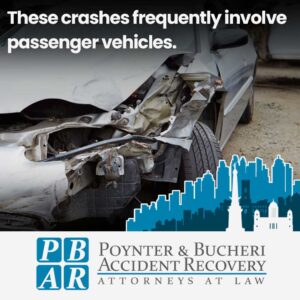
A jackknife accident occurs when a semi-truck’s trailer swings out and forms an angle with the truck’s cab, often during improper braking. These crashes frequently involve passenger vehicles and can lead to devastating or fatal injuries, and significant property damage.
Semi-truck accidents involving poor road conditions, adverse weather, or mechanical failure are complex, and determining liability may require examining the driver, the trucking company, or other parties.
If you were injured in a car accident caused by a jackknife truck crash, you may be entitled to recover compensation. An experienced truck accident lawyer can help you build a strong case and hold the responsible parties accountable.
What Makes Jackknife Truck Accidents Uniquely Dangerous
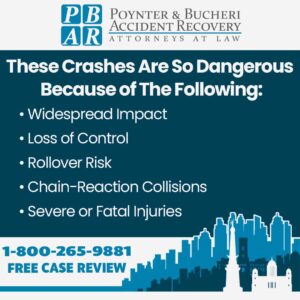
Jackknife truck accidents involving large commercial vehicles are some of the most dangerous crashes on Indiana roads. When a trailer swings out from the truck’s cab, it can lead to multi-vehicle pileups, rollovers, and catastrophic injuries—especially for occupants of smaller vehicles.
These crashes are so dangerous because of the following:
- Widespread Impact: The truck can sweep across multiple lanes, striking other vehicles and blocking traffic.
- Loss of Control: Drivers often can’t regain control—especially on wet or icy roads.
- Rollover Risk: The angle of the trailer increases the likelihood of a rollover.
- Chain-Reaction Collisions: These accidents frequently occur on highways, triggering pileups.
- Severe or Fatal Injuries: Smaller vehicles typically suffer the worst damage, resulting in traumatic or fatal injuries.
If you’re an accident victim, you may be entitled to compensation through the trucking company’s insurance provider or by pursuing legal action. Contact a truck accident lawyer at Poynter & Bucheri today for a free consultation.
Why Truck Driver Fatigue is a Leading Cause of Jackknife Accident
Driver fatigue is one of the leading causes of commercial truck accidents. Long hours behind the wheel, irregular sleep schedules, and pressure to meet tight deadlines can leave semi-truck drivers physically exhausted and mentally drained. When fatigue sets in, it impairs a driver’s ability to react quickly, make sound decisions, and safely navigate changing road conditions.
Even a brief lapse in focus can lead to improper braking, loss of control, or failure to adjust to slippery roads—any of which can cause the trailer to swing out and jackknife, putting other motorists at serious risk.
Due to the severity of Indianapolis truck accidents, accident victims often face long-term medical expenses, emotional trauma, and significant financial burdens. That’s why having an experienced truck accident lawyer by your side is so important.
Signs That a Truck Driver is Driving Fatigued
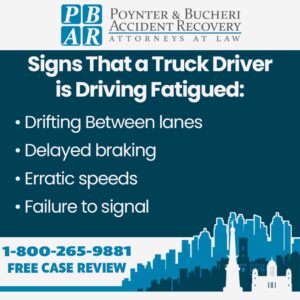
Fatigued driving isn’t always easy to spot, but there are warning signs that a semi-truck driver may be too tired to operate their vehicle safely—leading to driver negligence and reckless behavior. These signs can include:
- Drifting between lanes or overcorrecting
- Delayed braking or failure to maintain a safe following distance
- Erratic speeds—frequent slowing or sudden acceleration
- Failure to signal or respond to traffic signs
- Head bobbing or visible drowsiness
- Inconsistent steering or weaving
If you witnessed any of these behaviors before a serious accident, it could serve as critical evidence in your injury claim. A truck accident lawyer at Poynter and Bucheri can help identify all responsible parties, prove driver negligence, and negotiate with the insurance company to recover the compensation you deserve. Schedule a free consultation today.
How Hours of Service Regulations Attempt To Reduce Accidents
To address the dangers of driver fatigue, the Federal Motor Carrier Safety Administration (FMCSA) enforces Hours of Service (HOS) regulations. These rules limit how long a trucking company employee can operate a commercial vehicle without taking breaks or rest periods.
Key guidelines include:
- A maximum of 11 hours of driving after 10 consecutive hours off duty
- No more than 14 total on-duty hours in a single shift
- A required 30-minute break after 8 hours of driving
- A weekly limit of 60 or 70 hours on duty over 7 or 8 consecutive days
Indiana generally follows these federal guidelines but also uses roadside inspections and checkpoints to monitor compliance.
When drivers or companies violate these limits, it can lead to catastrophic accidents—and those violations may serve as key evidence of negligence for your legal team to use in your truck accident case.
External Injuries You Can Expect in a Jackknife Truck Accident
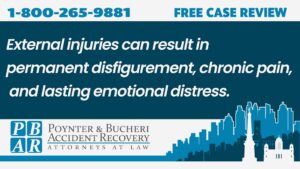
Jackknife accidents often result in violent collisions between commercial trucks and smaller vehicles, leading to serious injuries. These devastating injuries are typically visible and may require immediate medical attention, surgical intervention, or long-term rehabilitation. They also can result in mounting medical expenses, lost wages, and damages.
Common injuries include:
- Lacerations and deep cuts
- Bruising and contusions
- Burns
- Facial injuries
- Spinal cord injuries
- Road rash
- Crush injuries to limbs
External injuries can result in permanent disfigurement, chronic pain, and lasting emotional distress. In some cases, they may also serve as visible evidence of the overall severity of the semi-truck accident claim.
If you’ve suffered serious injuries in a jackknife accident, it’s critical to seek medical treatment immediately and to speak with a qualified truck accident lawyer about your legal rights.
How Cargo Loaders Could Be Liable for a Jackknife Truck Accident
In the trucking industry, drivers are often the first to be scrutinized after a jackknife accident. However, liability can also extend to third parties—particularly the individuals or companies responsible for loading the truck’s cargo.
Improperly loaded or unsecured freight can significantly impact how a truck handles, especially during braking or turning. These are common triggers in several types of truck accidents, including jackknifing, tire blowouts, and even brake failure.
When cargo shifts suddenly in transit due to being overloaded, unevenly distributed, or poorly secured, it can cause the truck to lose balance and increase the risk of a jackknife.
Cargo loaders may be held liable if:
- The cargo exceeded the truck’s legal weight limit
- The load was unbalanced, causing instability
- Freight was not properly secured using straps, locks, or containment
- They violated FMCSA cargo securement regulations
In many cases, a separate company (not the driver or trucking company) is responsible for loading. If driver negligence and cargo-related issues both contributed to the crash, multiple responsible parties may be identified.
At Poynter and Bucheri, our legal team can investigate loading records, weigh station data, and company protocols to determine whether cargo loading played a role in your accident—and demonstrate accountability of all liable parties.
Property Damage Compensation You May Be Entitled to After a Jackknife Accident
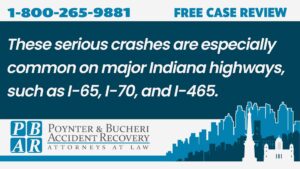
Jackknife truck accidents typically cause widespread property damage—not just to the vehicles involved but also to personal belongings inside them. If your car was damaged or totaled in the crash, you may be entitled to financial compensation to help recover your losses.
Compensable property damage may include:
- Vehicle repairs or replacement
- Towing and storage fees
- Rental car costs
- Damage to personal property
- Diminished vehicle value
While you can file a claim with the insurance company, it’s important to understand that trucking companies often have powerful insurance providers working to minimize payouts. These insurers may undervalue your insurance claim or try to shift blame to avoid liability.
Having legal representation strengthens your position by ensuring proper documentation, accurate valuation of your losses, and a fair fight against the trucking company’s insurer. An experienced truck accident attorney can help you pursue the full compensation you’re entitled to.
What Are Anti-Jackknife Devices?
Anti-jackknife devices are safety systems designed to prevent a truck’s trailer from swinging out of alignment with the cab. These technologies enhance stability and braking, particularly during sudden stops or on slippery roads.
Two common types include:
- Trailer Stabilizers: Apply automatic brake pressure to keep the trailer aligned
- Electronic Stability Control (ESC): Uses sensors to detect skidding and applies braking to help maintain control
While many newer commercial trucks have these systems, not all do—and some may be poorly maintained by the trucking company. If a truck lacked proper safety equipment or the system failed, it could influence how an insurance company evaluates liability. A truck accident attorney can investigate whether the lack or failure of anti-jackknife technology played a role in your semi truck accident.
How To Drive Defensively in Order To Avoid a Jackknife Truck Accident
While jackknife truck accidents are often caused by the driver or a mechanical failure, other drivers can reduce their risk of being involved in one by practicing defensive driving. Staying alert and maintaining safe habits on the road can help you avoid being caught in a truck’s path if it loses control.
Here are some defensive driving tips to help protect yourself:
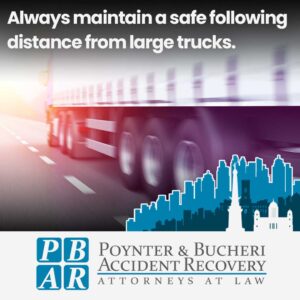
- Keep Your Distance: Always maintain a safe following distance from large trucks—especially in poor weather. A good rule of thumb is to stay at least four to five car lengths behind.
- Avoid Driving in Blind Spots: Semi-trucks have large blind spots on all sides. If you can’t see the driver’s mirrors, they likely can’t see you.
- Don’t Cut Off a Truck: Merging too closely in front of a truck can force the driver to brake suddenly—one of the most common triggers for a jackknife.
- Pass With Caution: Always pass on the left side and do so promptly. Lingering alongside a truck increases your risk if it begins to swerve or jackknife.
- Watch for Warning Signs: If a truck appears to be swerving, speeding, or slowing erratically, back off immediately. These can be signs of driver fatigue or loss of control.
- Be Extra Cautious in Bad Weather: Wet, icy, or windy conditions make it harder for trucks to maintain control. Give them extra space and avoid sudden movements near them.
Even with the best precautions, accidents can still happen. But by driving defensively, you increase your chances of staying safe and may even avoid a devastating jackknife crash altogether.
FAQS
What Environmental Factors Can Cause a Jackknife Accident?
Environmental conditions play a major role in the likelihood of jackknife truck accidents. Even when a driver is experienced and the vehicle is adequately maintained, certain external factors can reduce traction, impair visibility, or make it harder to maintain control—creating the perfect storm for a jackknife incident.
Common environmental contributors include:
- Wet or icy roads
- High winds
- Fog or low visibility
- Steep grades and curves
- Poor road maintenance
While drivers can’t control the weather, they are expected to adjust their driving behavior based on current road conditions. If a truck driver fails to slow down, increase the following distance, or use caution in dangerous weather, they may be found negligent, even if the environment played a role in the injury claim.
What is a Semi-Truck’s “No Zone?”
A semi-truck “No Zone” refers to its large blind spots—areas around the truck where the driver has limited or no visibility. Driving in these zones is dangerous, especially if the truck turns, stops suddenly, or jackknifes.
The four central “No Zones” include:
- Front: Trucks need a long distance to stop. Cutting in too closely can lead to rear-end collisions.
- Rear: Drivers can’t see directly behind their trailer. Tailgating limits your visibility and reaction time.
- Sides: Both sides, especially the right, have wide blind spots. If you can’t see the driver’s mirrors, they can’t see you.
Vehicles in a truck’s blind spots are often the first hit in a jackknife accident. Defensive driving can help prevent serious crashes.
What Evidence Shows a Truck Driver Was Responsible for a Jackknife Truck Accident?
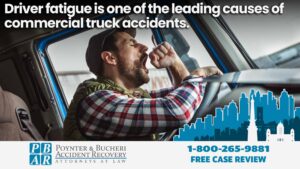
Establishing liability in a jackknife accident requires strong evidence and a clear understanding of Indiana law. To build a successful truck accident case, experienced attorneys often rely on multiple sources to prove the truck driver was at fault.
Key evidence includes:
Driver Behavior and On-Scene Evidence
- Dashcam or surveillance footage showing reckless driving or unsafe maneuvers
- Statements gathered when you interview witnesses
- The official police report, including crash diagrams and citations
Vehicle Data and Logs
- Black box (event data recorder) information on speed, braking, and steering
- Hours of Service (HOS) logs indicating possible rest violations or driver fatigue
Background and History
- The driver’s record, including prior violations and training credentials
- Cargo loading records and trucking company maintenance history (if applicable)
Environmental Conditions
- Road and weather reports showing conditions at the time of the crash
In more complex jackknife accident cases, an accident reconstruction expert may be brought in to analyze the crash scene and support the accident victim’s claims. A comprehensive review of evidence, including the police report and witness interviews, is vital for establishing liability and securing fair compensation.
We Are Your Jackknife Truck Accident Law Firm
If you or a loved one has been injured in a serious jackknife truck accident, you may be entitled to substantial compensation for your medical bills, lost wages, and pain and suffering. Don’t let powerful insurance companies undervalue your claim or delay the support you need. The team at Poynter and Bucheri is here to help you demand justice and hold negligent parties accountable.
Call 800-265-9881 today or click here to schedule your free case evaluation with a trusted Indianapolis truck accident attorney. Your case deserves attention, and so do you.
